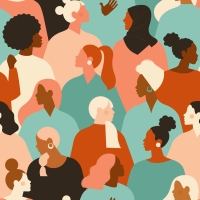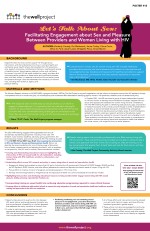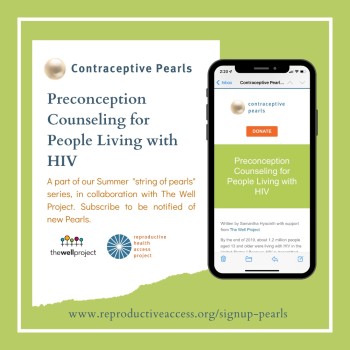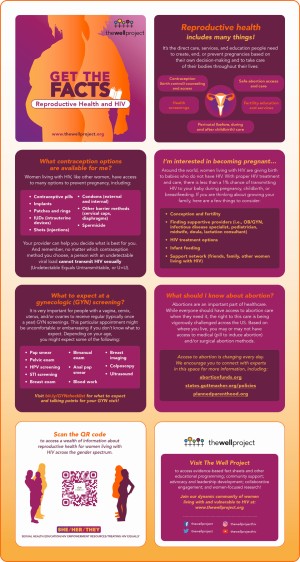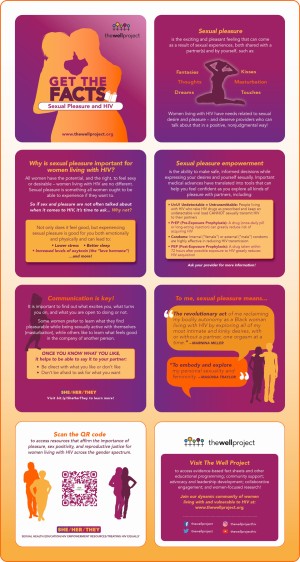
What's on This Page?
- About SHE/HER/THEY
- Expert Conversations
- Articles and Conference Coverage
- Wellness Fact Sheets
- Provider Resources
- Partner Highlights
- Order Materials
- SHE/HER/THEY en español
About SHE/HER/THEY
SHE/HER/THEY (Sexual Health Education/HIV Empowerment Resources/Treating HIV Equally) is an educational outreach initiative focused on improving engagement in care, health outcomes, and well-being for women living with and vulnerable to HIV while promoting language justice and holistic wellness through a non-stigmatizing lens.
Across all aspects of SHE/HER/THEY programming from development to dissemination, our approach to decreasing stigma and normalizing HIV includes:
- Centering the lives and experiences of Black women and other women of color across the gender spectrum
- Integrating sexual and reproductive health, including sex positivity and pleasure, into women-focused HIV care, prevention, and education efforts
- Increasing meaningful engagement with providers by encouraging culturally responsive care that addresses the whole woman, regardless of her HIV status
- Reframing the discussion of "risk" and focusing on the interconnected manifestations of HIV relevance and reasons for HIV prevention in women's lives
- Incorporating consistent undetectable equals untransmittable (U=U) messaging
Results from The Well Project's Women's Research Initiative on HIV/AIDS (WRI) 2021 annual meeting, Research at the Intersection of HIV and Women's Sexual and Reproductive Health, are a key component of the evidence base supporting SHE/HER/THEY.
We add new content to this page regularly – so please check back often for new informational materials and multi-media programs that we hope you will share widely!
Subscribe to our mailing list to ensure you receive email updates and/or printed materials as they become available.
Expert Conversations
WATCH! 2.0
WATCH! 2.0 (Women's Advocacy and Treatment Coalition on HIV) is The Well Project's seven-part treatment advocacy webinar series. True to our organization's values, WATCH! 2.0 puts women and advocacy at the forefront. Episodes 3, 4, and 5 are supported by ViiV Healthcare's Positive Action Grant Program.
Reproductive Life with HIV: Action Steps from Pregnancy Planning to Infant Feeding
You may already be aware of the fact that people living with HIV can have safe, healthy pregnancies and thriving babies who remain HIV-negative. Join us for the fifth session of the WATCH! 2.0 series, as we dig deeper into how we got to this point, what conception, pregnancy, birth, and the postpartum period can look like for parents living with HIV, and how advocacy for yourself and others can play a role.
Wellness in Action: Sexual Health, Pleasure, and HIV Across the Life Course
When women are able to take control of their sexual health, with an emphasis on bodily autonomy and pleasure, they can ensure the full range of their health needs are being met. Sex while living with HIV is often linked to stigma or shame, or both - but it doesn't have to be. Watch this episode of the WATCH! 2.0 series, and get armed with the tools and knowledge you need to take action around your sexual health.
Treatment + Prevention = Action! Understanding the Modern Era of HIV
Treatment options are among the first decisions a person makes after finding out an HIV diagnosis. As the field has advanced, HIV research has revealed more and more ways that HIV treatment can also be HIV prevention. Watch this session of WATCH! 2.0 to learn more about managing HIV treatment along with other aspects of life, how it promotes health and well-being for people living with HIV, and the ways that taking HIV drugs is intertwined with preventing new cases of HIV.
A Girl Like Me LIVE
A Girl Like Me LIVE is an interactive livestreaming series created to advance key topics related to health and wellness education among women living with and vulnerable to HIV.
National HIV Testing Day
The Well Project held a very special episode of A Girl Like Me LIVE in commemoration of National HIV Testing Day 2024, delving into the diverse narratives and experiences of women living with and vulnerable to HIV.
HIV, Women, & Sexual Pleasure
A Girl Like Me LIVE creator/host Ciarra "Ci Ci" Covin is joined by community advisory board member and pleasure guru Kim Canady in an interactive, candid conversation about sexual pleasure in the lives of women living with HIV.
Criminalization and Women Living with HIV
Listen in on this conversation for Black Maternal Health Week 2022, featuring Southern Black feminist attorney Mandisa Moore-O'Neal, on how HIV-specific laws affect the reproductive rights of Black women and relate to the policing of parenting choices.
Leadership Exchange LIVE
Leadership Exchange LIVE is a series connecting thoughtleaders in the HIV community to explore one another's work, activism, and personal experiences. Episodes are streamed and recorded before live online audiences.
Aging Positively: Health Screenings for Women With HIV
Some health conditions are more common in women living with HIV across the gender spectrum as we grow older. Check out this enlightening episode of Leadership Exchange LIVE, and listen in as Eileen Scully, MD, PhD, and The Well Project's stakeholder liaison, Bridgette Picou, LVN, ACLPN, discuss important health screenings and vaccinations.
Sex, Pleasure, and PrEP
Don't miss this empowering and informative discussion between The Well Project's community advisory board member Kim Canady (Pleasure Activist) and sexologist Ashley Cobb (The Black Dr. Ruth) as they explore the unique aspects of women's sexual experiences and discuss the importance of prioritizing pleasure and sexual satisfaction for all women living with and vulnerable to HIV.
Black Women Living with and Vulnerable to HIV in the US
Copresented with NASTAD, this episode of Leadership Exchange LIVE features a dynamic conversation with Latesha Elopre, MD, MSPH (University of Alabama at Birmingham) to uplift the unique needs and priorities and insights of Black women living with and vulnerable to HIV, with an emphasis on the US South. The session highlights optimal care for women and provides participants with best practices to improve their capacity to serve women.
Other Webinars and Conversations
Birth and Postpartum Support and HIV / El apoyo al parto y al posparto y el VIH
An illuminating conversation about the benefits of doula support for Black women and other birthing parents living with HIV. / Una conversación esclarecedora sobre los beneficios del apoyo de doula para las mujeres negras y otros padres que dan a luz que viven con el VIH.
Women Living, Learning, and Working with HIV
This bilingual session (video audio in English) featured a panel of women living with HIV highlighting their experiences related to work and education – including challenges they faced, strategies they used, and unmet needs they revealed.
Articles and Conference Coverage
Can We Talk About Sex?!? A Recap from AIDS 2024
"I found myself about to give up and not write anything – until I found myself in the Global Village," writes community advisory board member Kimberly Canady of her experience in Munich, Germany, at AIDS 2024.
A Chance of a Lifetime: A Recap from AIDS 2024
"The best part of being able to sit on the panel … was the fact that I was able to talk about women's health, sex, and pleasure," writes The Well Project community advisory board member Kim Canady of her experience speaking at AIDS 2024.
The Well Project's Ongoing Fight for Women's Health Rights and Inclusion in HIV Research (TheBody)
On an episode of TheBody's Instagram Live series "At Home With," The Well Project executive director Krista Martel talks with Charles Sanchez about what our organization is up to.
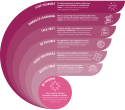
Positive Pleasure: The Well Project Signs On to The Pleasure Principles, Welcomes The Pleasure Project as a Partner
We cannot wait to explore collaboration with The Pleasure Project, and even further integrate the vital Pleasure Principles into all that we do at The Well Project. Onward toward pleasure for all!
Centering Sex, Pleasure, and Women: Recaps from the 2023 Biomedical HIV Prevention Summit

The agenda for the 2023 Biomedical HIV Prevention Summit in Las Vegas, Nevada, in April promised a gathering that would "focus on consensual sex in all of its iterations." The Well Project community advisory board chair Marissa Gonzalez attended the summit; as you will learn from her session summaries, the event did not disappoint!
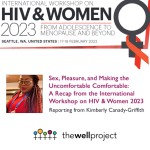
Sex, Pleasure, and Making the Uncomfortable Comfortable: A Recap from the International Workshop on HIV & Women 2023
Just like participating in sexual activity, the more you engage, the more you also learn what is best for you and your partner. This applies the same when having a conversation with your provider or your patient.
The Well Project at the US Conference on HIV/AIDS 2022
Several attendees and presenters shared their perspectives on The Well Project's funny, vulnerable, extremely popular USCHA 2022 session titled "Let's Talk About...Sexual and Reproductive Health for Women with HIV," which featured Black women across the gender spectrum speaking to their experiences navigating sex, pleasure, and self-regard while living with HIV.
The Well Project at the National Reproductive Justice Conference: Let's Talk About Sex! 2022
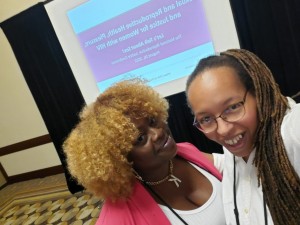
Our conference session featured a frank, participatory discussion covering key topics, developments, and personal storytelling at the intersections of reproductive justice and HIV – and highlighting the need for optimized HIV prevention and care to incorporate appropriate, relevant, and holistic sexual and reproductive healthcare.
Read the full write-up of the session and Kim Canady’s blog from the conference
Wellness Fact Sheets
Sexual and Reproductive Health, Rights, Justice, Pleasure, and HIV
Many complex factors affect women’s health and lives beyond HIV. Racism, sexism, poverty, violence, and other injustices have an impact on overall wellbeing – including being able to access healthcare and enjoy full sexual and reproductive lives. Learn about reproductive health, rights, and justice; the importance of centering pleasure; and why these areas must be connected with HIV-related care.
Getting Your Sexy On!!

Does HIV make it hard for you to feel sexy or be intimate? You are not alone! Many women living with HIV struggle in one way or another with intimacy after being diagnosed. Get some tips about how to boost your sex-esteem and put the pleasure back in sex!
Abortion and HIV
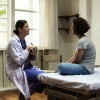
Abortion is a normal part of healthcare. Learn more about this safe, common, important procedure that is highly restricted in many parts of the world.
Abortion Laws and HIV in the US

Learn more about restrictions surrounding abortion and people's rights to make decisions about their own bodies.
Cannabis, HIV, and Your Health

Cannabis has many health benefits, including for people living with HIV. Learn about types of cannabis, its medicinal uses and HIV drug interactions, and ways it can be consumed.
Cannabis, Health, and the Law in the US
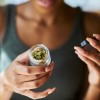
Cannabis has medicinal properties that can benefit people living with HIV, but its legality varies by location. Learn more about laws governing medical and adult-use cannabis in the US.
Immigration to the US, Women, and HIV: Facts and Resources
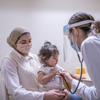
There is no legal barrier to immigrants making their home in the US if they are living with HIV – but there are other considerations. Learn more about getting HIV care and navigating this complex system.
US Immigration and HIV: The Basics
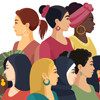
Learn some introductory information about the US's complicated immigration system – and its built-in biases.
Provider Resources
Providing for Women's Well-Being: A Sexual Health Conversation Guide for Clinicians
Providers can normalize HIV and integrate prevention into efforts to support women's overall health. Browse this resource for talking points and shareable infographics to help inspire and guide these crucial conversations.
Download a PDF of the talking points
Let's Talk About Sex: Facilitating Engagement About Sex and Pleasure Between Providers and Women Living with HIV
This conference poster asserted the need to acknowledge and address the full lives of women living with HIV and positively position sex in non-judgmental, proactive discussions with providers.
Education for Primary Care Providers on HIV and Reproductive Health
The Well Project was proud to collaborate with partner organization Reproductive Health Access Project (RHAP) on the following three HIV-specific articles for their "Contraceptive Pearls" series. RHAP – a leader in expanding access to abortion, contraception, and early pregnancy loss care – delivers these brief, evidence-based monthly "Pearls" to thousands of frontline healthcare providers to inform their practice.
- Preconception Counseling for People Living with HIV
- Contraceptive Counseling for People Living with HIV
- HIV Counseling & Screening for People Without HIV
Partner Highlights
Maintaining connections with mission-aligned organizations is a key aspect of The Well Project's work. Learn more about groups with which we have engaged as partners whose work shares values and goals with the SHE/HER/THEY program.
Black Women's Learning Institute
The Black Women's Learning Institute (BWLI) is a national center focused on the health and wellness needs of Black women across the lifespan.
Life and Love with HIV
Life and Love with HIV is a blog and online community dedicated to de-stigmatizing sexuality and relationships among women, partners, and couples living with HIV by shifting the focus from risk to pleasure.
Reproductive Health Access Project
The Reproductive Health Access Project works across the US to mobilize, train, and support primary care clinicians to make reproductive health care accessible to everyone.
SisterLove, Inc.
The mission of SisterLove, Inc. is to eradicate the adverse impact of HIV/AIDS and other reproductive health challenges upon women and their families.
SisterSong: Women of Color Reproductive Justice Collective
SisterSong is a Southern based, national membership organization; our purpose is to build an effective network of individuals and organizations to improve institutional policies and systems that impact the reproductive lives of marginalized communities.
The Afiya Center
The Afiya Center was established in response to the increasing disparities between HIV incidences worldwide and the extraordinary prevalence of HIV among Black women and girls in Texas.
The Pleasure Project
The Pleasure Project is an international education and advocacy organization working to eroticize safer sex.
Order Materials
NEW! Two "Get the Facts" Pamphlets – "Reproductive Health and HIV" and "Sexual Pleasure and HIV"
These are the informative, affirming, sexy resources you’ve been waiting for! The pocket-sized folding pamphlets (image files and PDFs below!) pack vital facts into an attractive, readable format. Our "Get the Facts" pamphlets are helpful to share at community events, in clinic waiting rooms – anywhere women living with HIV are served. (Ambos disponible en español)
Click the image above to save as a jpeg or share online; or download a printable pdf of "Get the Facts: Reproductive Health and HIV"
Click the image above to save as a jpeg or share online; or download a printable pdf of "Get the Facts: Sexual Pleasure and HIV"
Fill out this form to have free copies of these pamphlets and other educational materials shipped to your organization or practice!
SHE/HER/THEY en español
Thanks in part to the SHE/HER/THEY program, The Well Project has built upon our Spanish-language offerings, including:
- Increasing translation of existing materials
- Launching new fact sheets and outreach pamphlets in English and Spanish
- Offering Spanish interpretation at more of our recorded virtual events
- Releasing a monthly Spanish-language newsletter
Follow this link for all SHE/HER/THEY program materials that are available in Spanish!
More on:
Sexual Health and Pleasure
Reproductive Options
Mental Health
SHE/HER/THEY is currently supported through ViiV Healthcare's Positive Action Grant Program and has received funding from Gilead Sciences (Zeroing In), Merck, and NASTAD


